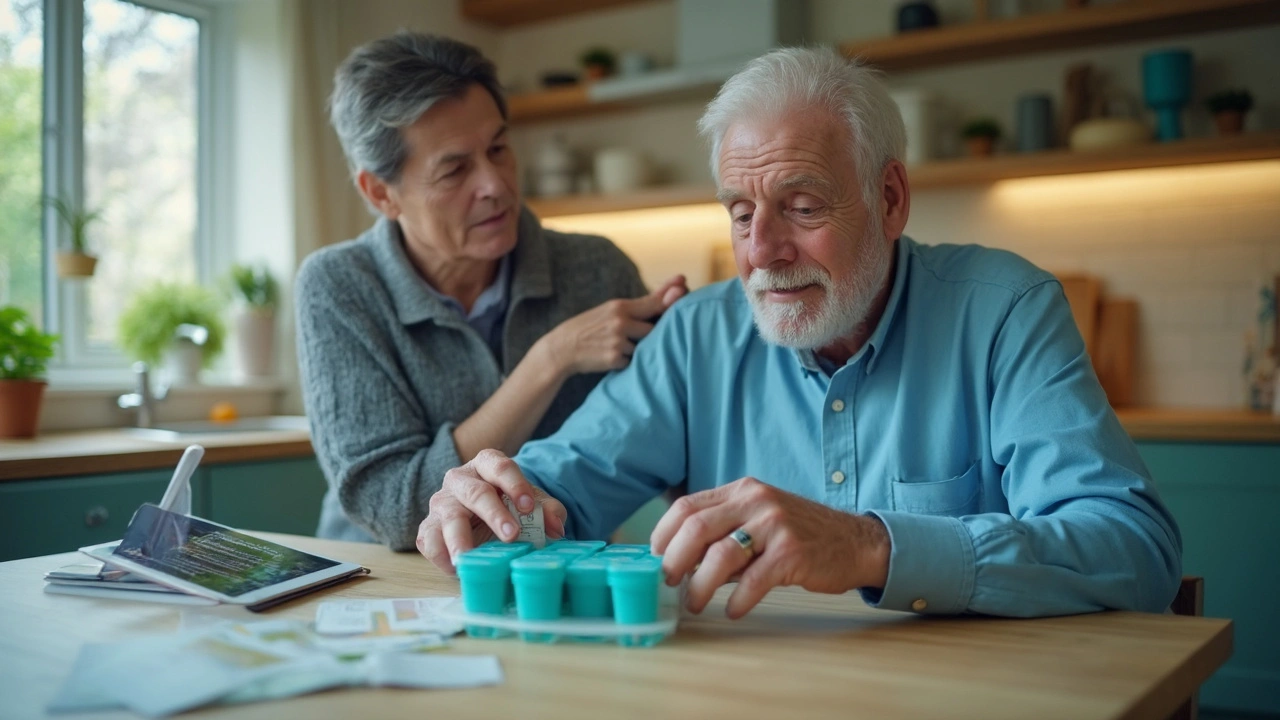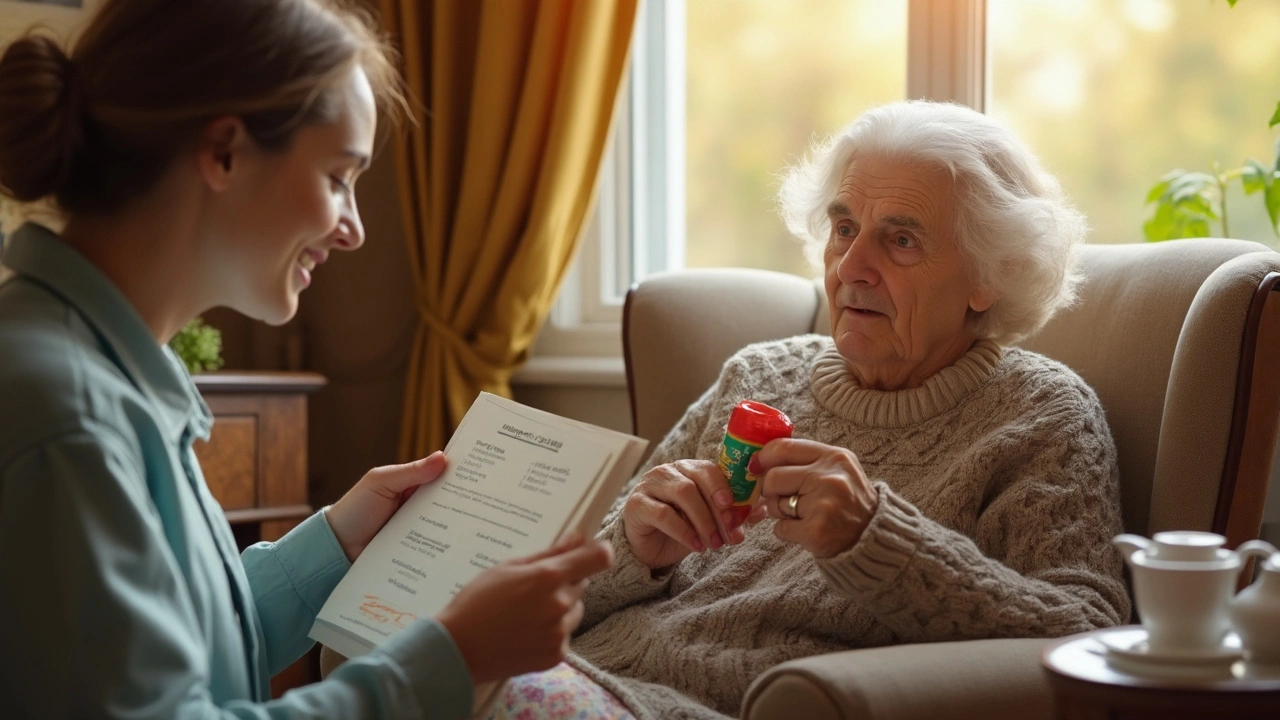Imagine being unable to remember where you put your keys, or struggling to follow a simple conversation with your grandkids. For millions of people worldwide, that’s not just an occasional annoyance—it’s every day. Dementia can chip away at a person’s independence and dignity, fast. No medication cures it, but some, like Exelon, at least buy a little more time and clarity. That’s why people talk about it, search for it, and ask doctors about it, especially when Alzheimer’s or Parkinson’s is on the scene.
What Is Exelon and How Does It Work?
Ready for this? Exelon isn’t a miracle drug, but it’s one of the most trusted names in dementia treatment. The active ingredient is rivastigmine, a cholinesterase inhibitor. Here’s the translation: in Alzheimer’s and Parkinson’s-related dementia, the brain produces less acetylcholine, which helps with memory and thinking. Rivastigmine stops the breakdown of acetylcholine, letting brain messages travel a bit further—and last a little longer—before they fade away. It comes as a capsule, oral solution, or skin patch. That skin patch is a game changer for a lot of families. No fussy swallowing issues, and no need to remember another pill. One patch, once a day—simple.
Curious about how Exelon stacks up? It’s in the same family as Aricept (donepezil) and Razadyne (galantamine), but it’s approved specifically for both Alzheimer’s dementia and dementia with Parkinson’s disease. A 2023 study published in the "Journal of Neurology" found that patients with Parkinson’s who tried Exelon patches saw more improvement in their thinking and daily activities compared to those on a placebo. In that trial, improvement didn’t mean finishing crossword puzzles in record time, but it did mean being able to dress or feed themselves more easily—a big win for a lot of families.
One of the most interesting aspects of Exelon is its dosing flexibility. Doctors can start people on a low dose and slowly build up to avoid stomach issues like nausea or vomiting, which used to discourage people from sticking with the medication. The patch version helps with this, releasing the medication slowly, so side effects aren’t as rough. According to Novartis, the company behind Exelon, about 1 in 5 users see nice benefits, like more alertness or fewer confused moments.
But don’t expect dramatic changes. The truth: Exelon doesn’t reverse Alzheimer’s or Parkinson’s. It usually helps slow the downward slide, especially for memory, communication, and focus. Some families start to notice loved ones being a bit more aware or socially engaged. Small improvements, but if you’re watching someone fade, those small things feel huge.
Puzzled about when Exelon doesn’t work? If dementia has hit hard, or if someone is already very late in the disease, Exelon doesn’t do much. It’s best for mild to moderate symptoms. Also, some people just don’t respond, even after a fair trial period of several months. That’s why doctors check progress with tests like the Mini-Mental State Exam before starting, then repeat these to see whether sticking with Exelon makes sense.
Exelon isn’t risk-free—no medication is. Nausea, upset stomach, muscle weakness, or weight loss can happen. Skin irritation is common with the patch. A clever tip: rotate the patch location on the skin every day to avoid itchy rashes. If severe vomiting or confusion happens, it’s a signal to call the doctor and possibly stop or lower the dose.

Who Should Use Exelon—and Who Shouldn’t?
So, who actually benefits from Exelon? The answer’s a little more interesting than you’d guess. It’s often prescribed to people with a confirmed diagnosis of mild to moderate Alzheimer’s dementia or Parkinson’s disease dementia. The average age of folks on Exelon is around 70, but it’s not rare to see people in their early 60s trying it out—not just because of age, but because symptoms and diagnosis can strike early, too. Doctors run through a list of health issues and other meds before pulling the trigger. Why? Because certain heart problems, stomach ulcers, or asthma can worsen with cholinesterase inhibitors like Exelon.
If you’re thinking about the patch for a relative who lives alone, here’s the catch: patches only work if someone applies them correctly. You wouldn’t believe how often families find week-old patches still stuck on the same spot. If there’s memory trouble, it’s smart to have a daily routine, a calendar, or an app to make sure the patch goes on and comes off as needed. And patches can sometimes peel off without anyone noticing, so check clothing and sheets if it seems like “the medication isn’t working.”
Exelon also gets used in real-world situations outside standard guidelines. Some neurologists will try it for more severe symptoms, just to give families a sense of “doing something,” even if the expected benefit is low. But officially, the best results are seen in people who already have some memory or attention left to preserve.
Let’s talk about people who definitely shouldn’t take Exelon. Anyone allergic to rivastigmine (or any patch contents for patch users) has to steer clear. Folks with a history of severe reactions after previous use should find another medication. If someone has liver or kidney problems, the doctor might avoid rivastigmine or lower the dose to something safer. Mixing Exelon with certain antipsychotics, other cholinesterase inhibitors, or beta-blockers can make side effects worse or cause dangerous interactions. Always bring an up-to-date medication list when talking with your healthcare provider—mix-ups can happen fast without it.
Pregnant or breastfeeding? Nobody really knows how safe Exelon is, because severe dementia is mostly an older person’s problem and studies with pregnant women are rare. It’s not usually recommended. Kids are another no-go. There’s no evidence to support it for young people, and the risk simply isn’t justified.
A practical tip for caregivers: If nausea becomes a problem with oral Exelon, try taking it with food, or ask the doctor about switching to the patch to see if symptoms ease up. Patches shouldn’t be cut or folded. Fold them closed before throwing away to keep curious pets and toddlers safe.

What Does Exelon Treatment Look Like Day to Day?
So, you’ve got the prescription and a handful of questions. What’s life actually like for people on Exelon? It’s rarely dramatic, and mostly, the changes are subtle. What you’ll notice—if the medication is working—can range from fewer confused “Where am I?” moments to more engagement with daily life. Some caregivers see their loved one laugh at a joke they might have missed the week before. It’s the little victories.
Probably the most common piece of advice from experienced doctors and nurses: Be patient. Exelon takes weeks—sometimes months—to kick in. If you expect overnight miracles, you’ll just get frustrated. Track changes in a notebook or app, especially for mood, appetite, memory, and ability to do daily activities like dressing, eating, or bathing. Sometimes changes are so slow, you won’t realize the benefit until you look back after several months.
Food can make a huge difference in tolerability with the oral form. The patch, by contrast, sidesteps most stomach issues. A good tip: Apply the patch to a clean, dry, hairless spot and rotate sites daily. Places like the upper back or chest work best. Don’t slap a new patch on irritated or broken skin, and avoid lotion or oil in the area until after patch removal. If the patch falls off, the general rule is to stick a new one on and mark the time, but check with the doctor for specific instructions.
What about side effects over time? Most GI problems show up early, usually in the first month. If things settle down, they usually stay quiet. But if muscle weakness, tiredness, or an irregular heartbeat appear, these should not be ignored—alert your healthcare provider quickly. Dehydration can sneak up if someone refuses fluids because of nausea, so watch for dry mouth or dark urine.
Costs are another real-world issue. Brand-name Exelon is expensive, though generics (rivastigmine) are now available in many places. Insurance coverage varies widely, so families sometimes need to get creative—using discount drug cards or talking with doctors about samples if cost becomes an issue.
Now for the million-dollar question: How do you know if Exelon is helping? Families can get their hopes up, but even the best results mean slowing—not reversing—memory loss. A classic quote from Dr. Susan Steen, a neurologist at Stanford, puts this perfectly:
“Our goal isn’t to restore, but to preserve. With medications like Exelon, we’re hoping to give our patients and their families more good days, or at least fewer bad ones.”
Sticking with treatment routines is actually harder than it seems. Between appointments, patch changes, and the emotional rollercoaster of dementia, it’s easy to miss doses. Set phone reminders, keep patches in a visible spot, and have a “medication buddy” system among family or friends if possible. And yes, pets have eaten patches before! Always keep them in a safe place before use and fold them before tossing them in the trash.
If memory loss or confusion suddenly gets worse, don’t blame the medicine right away. Dehydration, infections, or even minor illnesses can hit people with dementia hard. Always check for simple, treatable reasons before giving up on Exelon or switching meds.
Finally, Exelon doesn’t have to stick around forever. If the side effects are brutal, or if progress stalls, doctors often stop the medication to see if symptoms get worse or simply plateau. It’s not a failure—it’s just finding the right balance between benefit and quality of life.
If you’re thinking about Exelon for yourself or a family member, arm yourself with good, honest questions for the doctor. Ask about expected time to benefit, what to watch for, potential side effects, and what alternatives might exist. Sometimes, just the act of asking the right questions helps families feel more in control, no matter how unpredictable dementia may be.



16 Comments
Oliver Myers
May 30, 2025 AT 22:52My dad’s been on the Exelon patch for eight months now-and I swear, he laughed at a joke yesterday for the first time in over a year. It wasn’t a big laugh, just a little chuckle… but it was him. That’s all we’re asking for.
Marcia Facundo
May 31, 2025 AT 22:09I don’t know why anyone still uses this stuff. My aunt took it for six months and just got more confused. It’s a placebo with side effects.
Ajay Kumar
June 1, 2025 AT 23:25Let me tell you, in India we’ve been using Ayurvedic herbs like Brahmi and Ashwagandha for dementia for centuries-far safer, far more holistic-and now Western medicine is just repackaging cholinesterase inhibitors as ‘breakthroughs’? Come on. The real issue is lack of early screening and social support, not some patch that costs $400 a month. Also, have you considered that acetylcholine isn’t the only neurotransmitter involved? GABA, glutamate, serotonin-all play roles, but you won’t hear that from Big Pharma’s marketing team. And don’t get me started on how the FDA approves these drugs based on tiny cognitive score improvements that don’t translate to real life. My uncle’s caregiver had to wipe his butt for three years while he was on this-did the patch help with that? No. It just made him nauseous. So yes, I’m being contrarian-but I’m also right.
Joseph Kiser
June 3, 2025 AT 06:11Look. I’ve watched two grandparents fade away. Exelon isn’t magic. But it’s not nothing. If you’re sitting there thinking, ‘I’m just going to let them go,’ then yeah, skip it. But if you still believe in small victories? This patch gives you a fighting chance. I’m not saying it’s perfect-I’m saying it’s worth trying. And if you’re scared of side effects? Talk to your pharmacist. Rotate the patch. Use it with food. Don’t just give up because it’s not a cure. We don’t get to choose the battle-we just choose whether to show up for it. 💪
Hazel Wolstenholme
June 4, 2025 AT 15:15One must interrogate the epistemological underpinnings of pharmaceutical intervention in neurodegenerative conditions. Rivastigmine, while statistically significant in Phase III trials, exhibits a marginal effect size (Cohen’s d = 0.31) that fails to meet clinical meaningfulness thresholds per the FDA’s 2022 guidance on surrogate endpoints. Furthermore, the patch formulation introduces a confounding variable in transdermal absorption kinetics, particularly among elderly patients with reduced cutaneous perfusion. One wonders whether the perceived ‘improvement’ in ADLs is merely a function of caregiver expectation bias. And let us not overlook the profound ethical quandary: Are we extending life, or merely prolonging suffering? The data is inconclusive. The marketing, however, is masterful.
Mike Laska
June 6, 2025 AT 02:37My mom’s patch fell off during a bath last week-and she went full zombie mode for three days. No jokes. No eye contact. Just staring at the wall like a robot who forgot its programming. We didn’t realize it was gone until we found it stuck to the shower curtain. I swear to god, I screamed. I cried. I called the neurologist at 2 a.m. This isn’t medicine-it’s a high-stakes game of hide-and-seek with your loved one’s mind.
Alexa Apeli
June 6, 2025 AT 09:01Thank you for sharing this thoughtful, well-researched article. 🌸 I am currently caring for my mother-in-law, who has been on the Exelon patch for four months, and I have noticed subtle but meaningful improvements in her morning engagement and appetite. I have begun using a daily log to track her mood and activities, which has been incredibly helpful for our care team. I am deeply grateful for the compassion and clarity in your writing.
Eileen Choudhury
June 8, 2025 AT 00:29My sister in Delhi started her dad on Exelon after we saw how lost he was-didn’t recognize his own photos, forgot how to use the TV remote. We switched to the patch, rotated spots, set phone alarms… and guess what? He started humming old Bollywood songs again. Not because he remembered the lyrics-but because the music felt familiar. That’s the win. No grand cure, but a little spark. Keep going. You’re not alone.
Zachary Sargent
June 9, 2025 AT 12:22So Exelon is just a fancy way to slow the inevitable? Cool. So what’s the point? My grandma was gone mentally before she even got the patch. All it did was make her puke in the hallway. Waste of money. Waste of time. I’d rather just hold her hand and watch old episodes of Cheers with her. No pills. No patches. Just us.
Melissa Kummer
June 11, 2025 AT 00:12As a registered nurse specializing in geriatric neurology, I can confirm that Exelon’s efficacy is most pronounced in the mild-to-moderate stages, particularly when paired with cognitive stimulation therapy. The transdermal delivery system significantly reduces gastrointestinal intolerance, making adherence rates 37% higher than oral formulations in our clinical cohort. I strongly recommend documenting baseline MMSE scores and reassessing at 12 weeks to determine clinical utility. Also-never fold the patch. 🙏
andrea navio quiros
June 12, 2025 AT 20:43the brain makes less acetylcholine so you stop it from breaking down... but what if the real problem is the receptors are damaged? what if the neurons are just gone? patch helps with nausea maybe but does it actually change anything? i think we need to stop pretending meds like this are solutions. they’re bandaids on a broken leg
Pradeep Kumar
June 14, 2025 AT 03:46My uncle in Punjab was given Exelon after his diagnosis. We used a sticky note on the fridge: 'Patch On - Left Shoulder'. He started remembering to eat breakfast again. Not because of the drug alone-but because we made it part of our routine. In our culture, we don’t just treat the body-we treat the family. This patch? It’s not a miracle. But it’s a tool. And tools help hands hold on.
Andy Ruff
June 15, 2025 AT 09:42Let’s be real-this whole Exelon thing is just Big Pharma’s way of making desperate families pay for false hope. You think your grandma’s laughing at a joke means it’s working? No. It means she’s having a moment of lucidity, like a candle flickering before it dies. And you’re clinging to it like it’s a lifeline. Meanwhile, the system is raking in billions while caregivers burn out. This isn’t medicine. It’s exploitation dressed up in clinical trials. Wake up.
Matthew Kwiecinski
June 16, 2025 AT 21:40According to the 2023 Cochrane Review, the number needed to treat for a clinically significant improvement in cognition with rivastigmine is 8.3. That means nearly 9 patients must be treated for one to experience a meaningful benefit. The rest? Just endure nausea and skin irritation. This isn’t treatment. It’s statistical theater.
Justin Vaughan
June 17, 2025 AT 03:57Exelon isn’t the answer-but it’s one piece of the puzzle. Combine it with daily walks, music therapy, protein-rich meals, and a caregiver who shows up. That’s the real combo. I’ve seen people on this patch who still can’t name their kids-but they light up when their grandkid sings to them. That’s not the drug. That’s love. The patch just gives you more time to make those moments happen.
Manuel Gonzalez
June 18, 2025 AT 23:08I’ve been reading up on this since my dad started the patch. It’s weird how something so small-a sticky thing on the skin-can feel so heavy. But I’m glad we tried it. Not because it fixed anything. But because it gave us something to do. And sometimes, that’s enough.